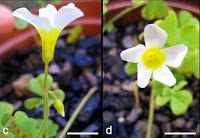Eremogones are small perennial flower in the Carnation family, Caryophyllaceae. They have thread-like leaves and small white (or sometimes pink) flowers, and tend to grow in thick clumps from woody horizontal stems. Ergomogones favour warm, dry climates.
In a paper published in the journal PhytoKeys on 25 February 2016, Murat Koç of the Department of Biology and Animal Production High School at Bozok University and Ergin Hamzaoğlu of the Department of Elementary Education at Gazi University describe a new species of Eremogone from Erzurum Province in eastern Turkey.
The new species is named Eremogone ali-gulii in honour of the hydrobiologist Ali Gül of the Gazi Faculty of Education at Gazi University. It is a tufted perennial herb reaching 10-18 cm in height, producing white flowers from June to July. The plant was found growing on serpentine soils (nutrient poor non-calcitic alkaline soils, typically derived from volcanic or metamorphic rocks) at two sites, one on Kop mountain between Bayburt and Aşkale and the other near Karasu village between Erzurum and Erzincan.
Eremogone ali-gulii, whole plant. Koç & Hamzaoğlu (2016).
Eremogone ali-gulii has been found growing only at two locations, both of which are prone to human disturbances such as grazing animals or land-use change. For this reason Koç and Hamzaoğlu recommend that it be classed as Endangered under the terms of the International Union for the Conservation of Nature’s Red List of Threatened Species.
See also...
 Two new species of Oxalis from Northern Cape Province, South Africa. Plants of the genus Oxalis are found in South America, where
there are around 250 species of herbs, shrubs and vines, and Southern Africa,
where there are around 210 species, all of which are bulbous perennials...
Two new species of Oxalis from Northern Cape Province, South Africa. Plants of the genus Oxalis are found in South America, where
there are around 250 species of herbs, shrubs and vines, and Southern Africa,
where there are around 210 species, all of which are bulbous perennials... A new species of Burr Marigold from Rapa in the Austral Islands, French Polynesia. The Austral Islands are a group of eight volcanic islands to the
south of the Society Islands in the southern Pacific Ocean.
Rapa is the second largest of these...
A new species of Burr Marigold from Rapa in the Austral Islands, French Polynesia. The Austral Islands are a group of eight volcanic islands to the
south of the Society Islands in the southern Pacific Ocean.
Rapa is the second largest of these... A new species of Tulip from Anhui Province in eastern China. Tulips of the genus Amana
are found in eastern Asia. They are very similar to the Tulips of Western Asia
and Europe, which are placed in the genus Tulipa,
differing only in the presence of bracts on the upper part of...
A new species of Tulip from Anhui Province in eastern China. Tulips of the genus Amana
are found in eastern Asia. They are very similar to the Tulips of Western Asia
and Europe, which are placed in the genus Tulipa,
differing only in the presence of bracts on the upper part of... Follow Sciency Thoughts on Facebook.

